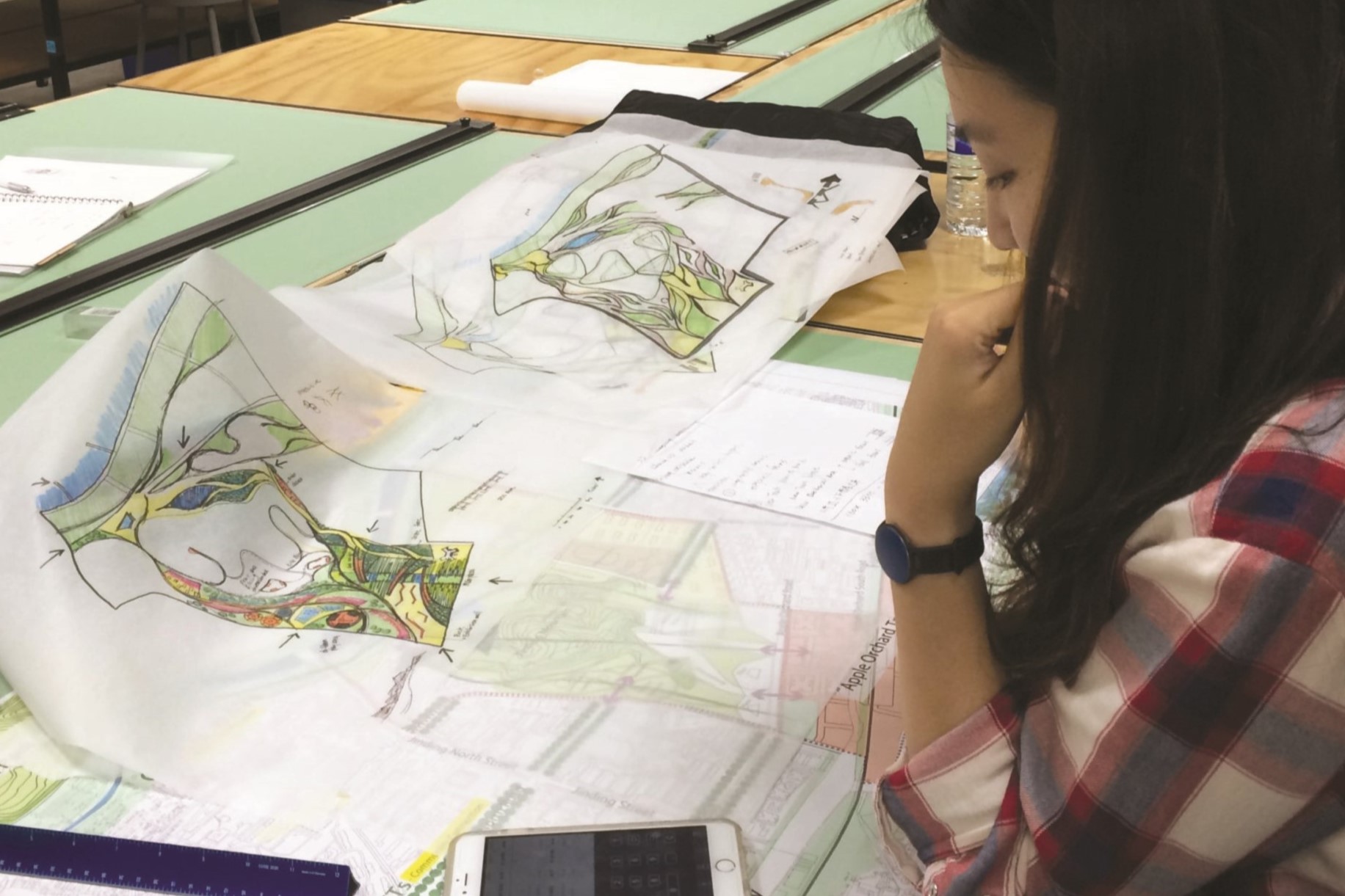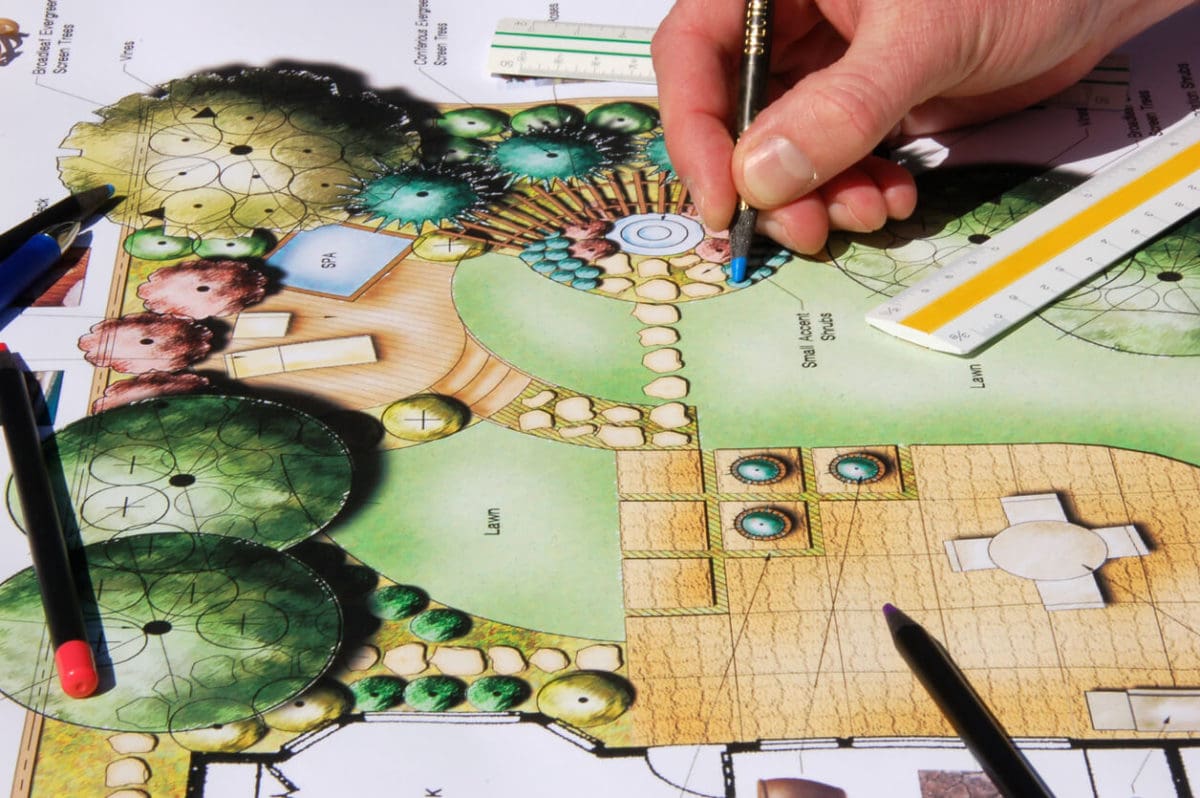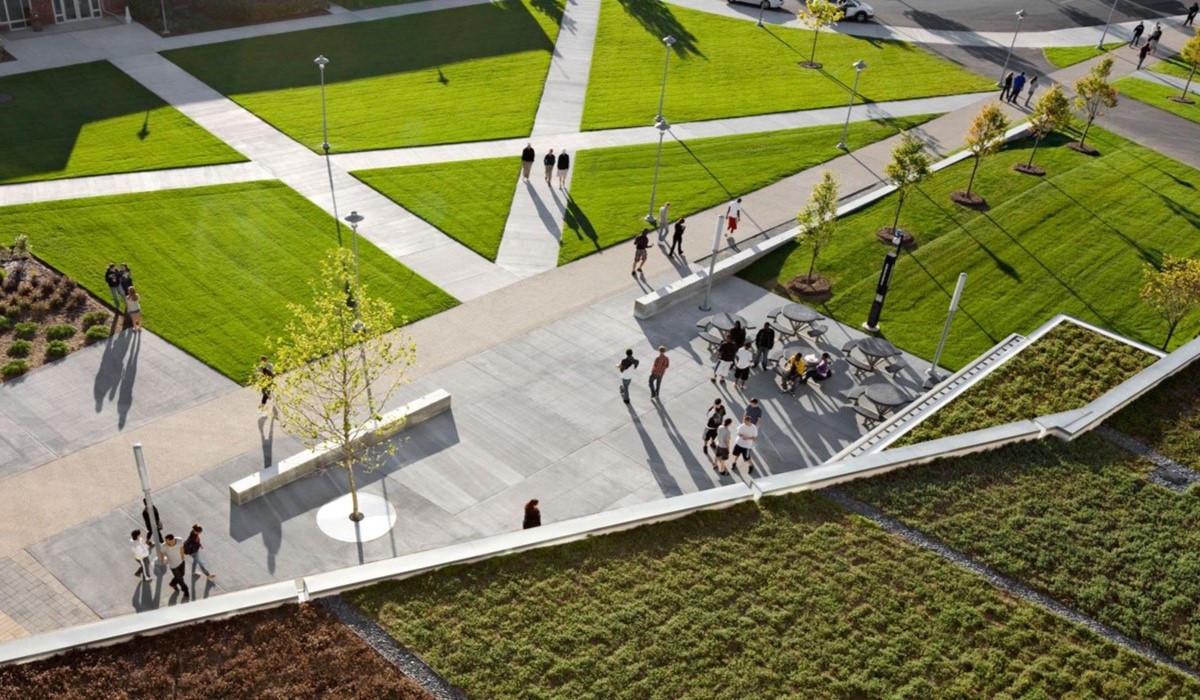Home>diy>Planning & Engineering>Which Undergraduate Major Should I Choose To Become A Landscape Architect?


Planning & Engineering
Which Undergraduate Major Should I Choose To Become A Landscape Architect?
Modified: March 24, 2024
Discover the ideal undergraduate major to pursue a successful career in landscape architecture. Explore the synergy between planning and engineering to unlock your true potential.
(Many of the links in this article redirect to a specific reviewed product. Your purchase of these products through affiliate links helps to generate commission for Storables.com, at no extra cost. Learn more)
Introduction
Choosing an undergraduate major can be a daunting task, especially when you have a specific career goal in mind. If you aspire to become a landscape architect, it’s important to select a major that will provide you with the necessary knowledge and skills to succeed in this field. In this article, we will explore various undergraduate majors that can lead to a career in landscape architecture.
Before diving into the various majors, it’s crucial to understand the key considerations when making your decision. Firstly, you should assess your own interests and strengths. What subjects do you enjoy studying? What skills do you excel in? Understanding your own passions and aptitudes will guide you in selecting a major that aligns with your abilities and preferences.
Secondly, you should research the requirements and expectations of landscape architecture programs. Some universities may have specific prerequisites or recommended majors for admission into their landscape architecture programs. Familiarizing yourself with these program-specific requirements will help you make an informed decision about your undergraduate major.
Lastly, keep in mind that while certain majors may offer a more direct path to landscape architecture, it’s important to maintain a broad interdisciplinary perspective. Landscape architecture is a field that encompasses various disciplines and requires a diverse skill set. Therefore, consider majors that expose you to relevant subjects such as design, environmental science, and urban planning.
With these considerations in mind, let’s explore some recommended undergraduate majors that can pave the way for a successful career in landscape architecture.
Key Takeaways:
- Choosing the right undergraduate major for a career in landscape architecture involves aligning personal interests and strengths with relevant disciplines such as landscape architecture, environmental science, urban planning, horticulture, geography, architecture, civil engineering, and sustainability studies.
- Each recommended undergraduate major offers unique knowledge and skills that complement the field of landscape architecture, providing a diverse skill set and holistic perspective essential for success in this interdisciplinary profession.
Considerations for Choosing an Undergraduate Major
When deciding on an undergraduate major to pursue a career in landscape architecture, there are several important factors to consider. Here are a few key considerations to keep in mind:
- Alignment with Landscape Architecture: Look for majors that have a strong connection to landscape architecture. These majors will provide you with a solid foundation in the principles and practices of the field. Courses such as landscape design, ecology, sustainability, and land use planning are particularly valuable.
- Prerequisites for Landscape Architecture Programs: Check the admission requirements of the landscape architecture programs you are interested in. Some programs may have specific prerequisites or recommended majors that can enhance your chances of getting accepted. Taking these prerequisites during your undergraduate studies can save you time and ensure a smooth transition into a landscape architecture program.
- Interdisciplinary Approach: Landscape architecture is an interdisciplinary field, so consider majors that offer a broad range of courses spanning design, ecology, urban planning, and environmental science. This interdisciplinary approach will equip you with a diverse skill set and a well-rounded perspective, both of which are invaluable in the landscape architecture profession.
- Strengths and Interests: Take the time to reflect on your own strengths and interests. Which subjects do you enjoy the most? Where do your skills lie? Choosing a major that aligns with your passions and strengths will make your undergraduate experience more enjoyable and increase your chances of success in the field.
- Career Opportunities: Consider the career opportunities available in your chosen major. While landscape architecture may be your ultimate goal, having alternative career paths can provide a safety net and expand your professional options. Look for majors that offer transferable skills and a wide range of job prospects.
Keep in mind that it’s important to strike a balance between choosing a major that prepares you for a career in landscape architecture and one that aligns with your personal interests and strengths. Taking the time to research and consider these factors will set you on the right path to selecting an undergraduate major that will propel you towards a successful career in landscape architecture.
Recommended Undergraduate Majors for Landscape Architecture
While there is no single “correct” undergraduate major for landscape architecture, certain majors provide a strong foundation and set you up for success in this field. Here are some recommended undergraduate majors to consider:
- Landscape Architecture: Pursuing a Bachelor’s degree in Landscape Architecture is the most direct path to a career in this field. With this major, you will gain comprehensive knowledge and skills in landscape design, site planning, environmental sustainability, and urban development. This major combines both creativity and technical expertise, preparing you for a successful career as a landscape architect.
- Environmental Science: A degree in Environmental Science is highly relevant to landscape architecture. This major focuses on the study of ecosystems, environmental conservation, and sustainable practices. Understanding the scientific aspects of the environment will greatly complement your landscape architecture knowledge, allowing you to design projects that are environmentally sensitive and sustainable.
- Urban Planning: Urban Planning is another excellent undergraduate major for aspiring landscape architects. This major focuses on the design and development of urban areas, including land use planning, community development, and transportation systems. Urban planners work closely with landscape architects, and having a background in urban planning will enable you to approach landscape architecture projects with a broader perspective.
- Horticulture: A major in Horticulture provides a deep understanding of plants and their cultivation. This knowledge is essential for landscape architects who work extensively with plant selection, garden design, and plant health. By studying horticulture, you will gain expertise in plant identification, landscaping techniques, and plant physiology, enhancing your ability to create beautiful and functional outdoor spaces.
- Geography: Geography is a major that examines the physical, social, and cultural aspects of the Earth’s landscapes. It focuses on spatial analysis, maps, and the relationship between humans and their environment. Studying geography will give you a broader appreciation for the natural and built environments, allowing you to approach landscape architecture projects with a well-rounded perspective.
- Architecture: While landscape architecture and architecture are distinct fields, a degree in Architecture can provide valuable knowledge and skills for landscape architects. This major focuses on principles of design, spatial planning, and construction techniques. Understanding the built environment from an architectural perspective will enhance your ability to seamlessly integrate landscape and structures in your designs.
- Civil Engineering: Civil Engineering is another major that can complement a career in landscape architecture. This discipline focuses on the design and construction of infrastructure, such as roads, bridges, and drainage systems. A background in civil engineering will equip you with technical knowledge and problem-solving skills that are essential for the implementation of landscape architecture projects.
- Sustainability Studies: A major in Sustainability Studies provides knowledge about sustainable practices, environmental policy, and resource management. Understanding sustainability principles is crucial for landscape architects who are committed to creating environmentally friendly and resilient designs. This major will provide you with the tools to address ecological challenges and incorporate sustainability into your landscape architecture projects.
Remember, these recommended undergraduate majors are not exclusive, and each brings a unique perspective to landscape architecture. It’s important to research the specific curriculum and courses offered by universities to ensure they align with your career goals and interests. Additionally, consider seeking internships or extracurricular opportunities to gain practical experience and further enhance your skills in landscape architecture.
By selecting an undergraduate major that speaks to your passions and complements the field of landscape architecture, you will be well-prepared to embark on a rewarding career shaping the outdoor spaces we inhabit.
Landscape Architecture
A Bachelor’s degree in Landscape Architecture is the most direct and comprehensive path for those aspiring to become landscape architects. This major provides a deep understanding of the principles, theories, and practices of landscape design.
Throughout the program, students are exposed to a wide range of coursework that covers various aspects of landscape architecture. This includes site analysis, landscape planning, urban design, horticulture, ecology, and sustainable design. Students also gain hands-on experience through studio projects, where they apply their knowledge to design and create landscapes.
One of the key benefits of studying landscape architecture is the focus on the integration of natural and built environments. Students learn how to design outdoor spaces that are not only aesthetically pleasing but also functional, sustainable, and environmentally sensitive. They develop skills in site planning, plant selection, construction techniques, and sustainable practices.
Landscape architecture programs often incorporate design studio courses where students work in teams to develop landscape designs for real-world projects. They learn how to consider factors such as site conditions, client needs, budget constraints, and environmental sustainability. These design studios provide invaluable opportunities for students to refine their design skills, think critically, and gain practical experience.
Upon graduation, landscape architecture majors are well-prepared to enter the workforce as entry-level landscape architects or continue their education in graduate programs. They possess the necessary skills to work in various settings, including private landscape architecture firms, government agencies, urban planning organizations, and environmental consulting firms.
In addition to the technical skills gained through their coursework, landscape architecture majors also develop essential soft skills. Communication, problem-solving, creativity, and project management are emphasized throughout the program, equipping graduates with the ability to effectively collaborate with clients, architects, engineers, and other professionals.
To pursue a career in landscape architecture, it is crucial to select a landscape architecture program that is accredited by the Landscape Architectural Accreditation Board (LAAB). Accredited programs meet specific educational standards and ensure that graduates are qualified to seek licensure as professional landscape architects.
By studying landscape architecture, aspiring professionals can cultivate their passion for the environment, design, and creating outdoor spaces that positively impact communities and individuals. It is a rewarding major that opens an array of possibilities in the field of landscape architecture.
Environmental Science
For those interested in the intersection of environmental conservation and landscape design, pursuing a Bachelor’s degree in Environmental Science can provide a strong foundation for a career in landscape architecture.
Environmental Science majors engage in the study of the Earth’s diverse ecosystems, focusing on topics such as ecology, environmental conservation, sustainability, and natural resource management. They gain a deep understanding of the interactions between organisms and their environment, as well as the impact of human activities on these systems.
Studying environmental science as an undergraduate major offers numerous benefits for aspiring landscape architects. First and foremost, it provides an in-depth understanding of natural systems and processes, which is essential for creating sustainable and ecologically sensitive landscape designs.
Environmental science coursework covers a range of subjects, including ecology, biology, chemistry, geology, hydrology, and climatology. This interdisciplinary approach allows students to develop a holistic understanding of the environment and how it can inform landscape architecture practices.
By studying environmental science, students also gain knowledge about environmental laws and policies, environmental assessment and impact analysis, and environmental remediation techniques. This knowledge is valuable when navigating the regulations and requirements surrounding landscape architecture projects.
Furthermore, environmental science majors often gain field experience through internships, research projects, or field courses. These experiences provide hands-on learning opportunities, allowing students to apply their knowledge in real-world settings. Fieldwork can involve conducting environmental surveys, analyzing data, and assessing the impact of human activities on ecosystems.
With a degree in environmental science, individuals can pursue careers as environmental consultants, environmental planners, or environmental educators. They can also work as landscape architects, specializing in environmentally focused projects.
When choosing an environmental science program, it is beneficial to look for courses or electives that specifically relate to landscape architecture or design. These courses may cover topics such as ecological landscape design, green infrastructure, or site planning.
Overall, studying environmental science as an undergraduate major offers a strong foundation in environmental knowledge and sustainability principles. It equips aspiring landscape architects with the necessary understanding of natural systems, allowing them to create landscapes that enhance and protect the environment while providing functional and aesthetically pleasing outdoor spaces for communities.
Read more: How To Become Landscape Architect
Urban Planning
If you have a passion for shaping the built environment and want to contribute to the design and development of cities, pursuing a Bachelor’s degree in Urban Planning can provide a solid foundation for a career in landscape architecture.
Urban Planning is a multidisciplinary field that involves the study and practice of designing, managing, and guiding the development of urban areas. It focuses on creating sustainable, equitable, and well-functioning cities and communities.
Studying urban planning as an undergraduate major offers several advantages for aspiring landscape architects. Firstly, it provides a comprehensive understanding of how cities function and evolve. Urban planning coursework delves into areas such as land use planning, transportation planning, urban design, economic development, and community engagement.
By understanding the complexities of urban systems and the social, economic, and environmental factors that shape them, future landscape architects gain valuable insights into creating landscapes that seamlessly integrate with their urban surroundings.
Urban planning programs emphasize urban design, which is a crucial aspect of landscape architecture. Students learn about the principles and techniques for designing public spaces, streetscapes, plazas, and parks. This knowledge contributes to their ability to create aesthetically pleasing, functional, and people-centered outdoor environments.
Furthermore, urban planning majors gain expertise in assessing community needs, engaging stakeholders, and understanding the social impact of development projects. These skills, combined with landscape architecture knowledge, allow graduates to create inclusive and socially sustainable landscapes that meet the needs and aspirations of diverse communities.
Urban planning programs often incorporate hands-on experiences, such as internship opportunities or studio courses, where students work on real projects in collaboration with professionals and community members. These practical experiences provide valuable insights into the complex dynamics of urban development and sharpen the students’ problem-solving and communication skills.
Upon graduation, individuals with a degree in urban planning can pursue diverse career paths. They can work in urban planning and design firms, government agencies, or nonprofit organizations focused on community development. Many urban planning graduates also choose to specialize in landscape architecture, combining their knowledge of urban systems with landscape design principles.
When selecting an urban planning program, it’s essential to look for courses or concentrations that emphasize design, landscape architecture, or urban green spaces. These courses may cover topics such as urban ecology, green infrastructure, or sustainable urban development.
By studying urban planning as an undergraduate major, aspiring landscape architects can develop a deep understanding of urban dynamics and gain the skills to create innovative and sustainable landscapes that enhance the quality of life in cities and shape the future of urban environments.
Consider majoring in landscape architecture, horticulture, environmental design, or urban planning. These majors provide a strong foundation for a career in landscape architecture.
Horticulture
If you have a passion for plants and a keen interest in the science and art of gardening, pursuing a Bachelor’s degree in Horticulture can provide a strong foundation for a career in landscape architecture.
Horticulture is the study and practice of plant cultivation and management. It encompasses a wide range of subjects, including plant biology, plant propagation, pest management, landscape design, and plant physiology.
Studying horticulture as an undergraduate major offers several benefits for aspiring landscape architects. Firstly, it provides a deep understanding of plants and their requirements. Students learn about plant identification, botany, soil science, and plant nutrition. This knowledge is invaluable for landscape architects when selecting appropriate plant species and designing landscapes that promote healthy and flourishing vegetation.
As horticulture majors, students gain hands-on experience in various aspects of gardening and plant care. They participate in practical activities such as planting, pruning, soil testing, and nursery management. This hands-on experience helps develop practical skills that are directly applicable to landscape architecture, especially in projects that involve plant selection, establishment, and maintenance.
Another advantage of studying horticulture is the emphasis on landscape design. Horticulture programs often include courses or electives in landscape design principles and techniques. Students learn about hardscaping, softscaping, and landscape aesthetics. They also study the principles of garden design, including spatial composition, color theory, and plant placement. This knowledge enhances landscape architects’ ability to create visually appealing and functional outdoor spaces.
Horticulture programs also cover topics related to sustainable landscaping practices. Students learn about water-efficient irrigation systems, organic gardening, and the use of native and adapted plants. These sustainable practices align with the growing emphasis on environmental responsibility in landscape architecture. Graduates with a background in horticulture can contribute to environmentally friendly landscape designs that conserve resources and support the natural ecosystem.
After completing a degree in horticulture, individuals can pursue various career paths. They can work in landscape design firms, botanical gardens, nurseries, or public parks. Some graduates choose to specialize in landscape architecture, combining their knowledge of plants with design principles to create stunning and functional outdoor environments.
When selecting a horticulture program, consider universities that offer courses or concentrations in landscape design, landscape horticulture, or garden design. Additionally, seek opportunities for internships or cooperative education experiences that provide practical exposure to landscape projects.
By studying horticulture as an undergraduate major, aspiring landscape architects gain a deep understanding of plants, gardening practices, and design principles. This knowledge equips them with the skills to create breathtaking landscapes that thrive with lush vegetation and showcase the beauty and diversity of plants.
Geography
If you have a fascination for the Earth’s landscapes, spatial analysis, and the relationship between humans and their environment, pursuing a Bachelor’s degree in Geography can provide a solid foundation for a career in landscape architecture.
Geography is the study of the Earth’s physical features, climate patterns, human activities, and their interconnectedness. It offers a unique perspective for understanding the complexities of the natural and built environments.
Studying geography as an undergraduate major offers several advantages for aspiring landscape architects. Firstly, it provides a comprehensive understanding of the physical and cultural factors that shape landscapes. Courses in geography cover topics such as landforms, climate, ecosystems, population distribution, and urban development, providing a holistic understanding of the diverse environments in which humans reside.
Geography majors learn about spatial analysis, which is a crucial skill for landscape architects. They acquire knowledge about Geographic Information Systems (GIS), which enables them to gather, analyze, and interpret spatial data. This skill allows future landscape architects to make informed decisions when designing outdoor spaces and considering factors such as land use, site conditions, and environmental impacts.
Geography programs also emphasize human-environment interaction. Students learn about the social, economic, and cultural aspects that influence land use patterns, urban development, and environmental management. This knowledge is valuable for landscape architects when considering the needs and preferences of communities in their design process.
Another advantage of studying geography is the focus on map reading, cartography, and visualization techniques. Geography majors gain skills in creating maps, analyzing spatial relationships, and presenting information visually. These skills can be applied to conveying design concepts, presenting site plans, or mapping out project proposals for clients or stakeholders.
Geography programs often offer courses or concentrations in urban geography, environmental geography, or landscape studies. These specialized courses explore topics such as urban green spaces, cultural landscapes, or the role of geography in sustainable development. Students can tailor their coursework to align with their interests in landscape architecture.
Graduates with a degree in geography can pursue careers in various fields, including urban planning, environmental consulting, geographic research, or GIS analysis. Many individuals also choose to specialize in landscape architecture, combining their geographic knowledge with design principles to create meaningful and contextually aware outdoor environments.
When researching geography programs, consider universities that offer courses or opportunities related to landscape studies, urban geography, or environmental planning. Additionally, seek practical experiences such as internships or research projects that provide hands-on exposure to landscape architecture projects and allow for the application of geographic skills.
By studying geography as an undergraduate major, aspiring landscape architects gain a valuable perspective on the Earth’s landscapes, human-environment relationships, and spatial analysis. This knowledge enables them to design landscapes that are responsive to both the natural and cultural aspects of a site, creating outdoor spaces that are harmonious, functional, and aesthetically pleasing.
Architecture
If you have a passion for both design and the built environment, pursuing a Bachelor’s degree in Architecture can provide a strong foundation for a career in landscape architecture.
Architecture is the art and science of designing and constructing buildings and other physical structures. Although architecture and landscape architecture are distinct fields, they share many similarities and overlap in their focus on design, aesthetics, and functionality.
Studying architecture as an undergraduate major offers several advantages for aspiring landscape architects. Firstly, it provides a comprehensive understanding of design principles, spatial planning, and construction techniques. Architecture coursework covers topics such as architectural history, design studio, materials and structures, building systems, and sustainable design.
By studying architecture, future landscape architects develop a keen eye for spatial composition, form, and visual aesthetics. They gain a deep understanding of how to create harmonious and visually pleasing built environments. This knowledge seamlessly translates into creating landscape designs that integrate with existing structures and enhance their overall appeal.
Furthermore, architecture programs emphasize critical thinking, problem-solving, and design processes. Students learn how to conceptualize ideas, develop design strategies, and effectively communicate their visions. These skills are crucial for landscape architects when working on complex projects that require innovative solutions and effective collaboration with clients, architects, and other professionals.
Architecture majors also gain expertise in site analysis and understanding the relationship between buildings and their surroundings. They learn how to assess site conditions, analyze sun and wind patterns, and consider the impact of buildings on the environment. This knowledge is directly applicable to landscape architecture, as landscape architects often design outdoor spaces in conjunction with existing buildings or plan how landscapes can enhance the overall ecosystem of a site.
Architectural programs typically include design studio courses, where students work on real or hypothetical design projects. These design studios provide valuable opportunities for students to develop their design skills, explore various design approaches, and consider the integration of landscape elements into architectural designs.
After completing a degree in architecture, individuals can pursue diverse career paths, such as becoming an architect, architectural designer, or building consultant. Many architecture graduates also choose to specialize in landscape architecture, combining their architectural knowledge with landscape design principles to create holistic and cohesive outdoor environments.
When selecting an architecture program, consider universities that offer courses or concentrations related to landscape architecture or site planning. Additionally, seek opportunities to work on projects that involve the integration of architecture and landscape design.
By studying architecture as an undergraduate major, aspiring landscape architects gain a deep understanding of design principles, spatial planning, and the relationship between buildings and their surroundings. This knowledge equips them with the skills to create integrated and visually compelling outdoor spaces that harmoniously interact with the built environment.
Read more: How Difficult Is It To Transition From A Political Science Major To Becoming A Landscape Architect?
Civil Engineering
For individuals interested in both the design and construction aspects of outdoor spaces, pursuing a Bachelor’s degree in Civil Engineering can provide a strong foundation for a career in landscape architecture.
Civil engineering is a discipline that focuses on the design, construction, and maintenance of infrastructure, such as roads, bridges, buildings, and water supply systems. While civil engineering and landscape architecture have distinct areas of specialization, there is significant overlap that can greatly benefit aspiring landscape architects.
Studying civil engineering as an undergraduate major offers several advantages for those pursuing a career in landscape architecture. Firstly, civil engineering programs provide a strong technical foundation in areas such as structural engineering, hydraulic systems, geotechnical engineering, and construction management. This knowledge is valuable when working on landscape architecture projects that involve retaining walls, drainage systems, or site construction.
Civil engineering coursework also emphasizes site analysis and planning. Students learn about surveying, topographical mapping, and site grading. This expertise allows future landscape architects to accurately assess the terrain, understand soil conditions, and design landscapes that seamlessly integrate with the natural features of the site.
Additionally, civil engineering students gain knowledge in sustainable design and environmental stewardship. They learn about sustainable construction materials, water conservation techniques, and green infrastructure systems. This knowledge aligns with the increasing importance of environmental sustainability in landscape architecture and enables graduates to create landscape designs that prioritize conservation and minimize environmental impact.
Furthermore, civil engineering majors build strong problem-solving and analytical skills. They learn to approach complex engineering problems by applying scientific principles and mathematical calculations. This mindset translates well into landscape architecture, where professionals are often faced with challenges that require innovative solutions and careful consideration of multiple factors.
Upon graduation, individuals with a degree in civil engineering can pursue careers in various fields, such as civil engineering firms, construction companies, or government agencies responsible for infrastructure development. Many civil engineering graduates also choose to specialize in landscape architecture, combining their engineering knowledge with design principles to create outdoor spaces that are both functional and aesthetically pleasing.
When selecting a civil engineering program, consider universities that offer courses or electives related to landscape engineering, sustainable design, or site development. Look for opportunities to work on projects that involve site planning, land development, or the integration of engineering and landscape design.
By studying civil engineering as an undergraduate major, aspiring landscape architects gain a strong technical foundation, site analysis skills, and knowledge of sustainable design principles. This knowledge enables them to design landscapes that are not only visually appealing but also structurally sound, environmentally friendly, and built to withstand various challenges over time.
Sustainability Studies
In an era where environmental responsibility and sustainable practices are increasingly important, pursuing a Bachelor’s degree in Sustainability Studies can provide an excellent foundation for a career in landscape architecture.
Sustainability Studies is a multidisciplinary field that focuses on the social, economic, and environmental aspects of sustainability. It explores topics such as renewable energy, environmental conservation, resource management, and sustainable development.
Studying sustainability as an undergraduate major offers several advantages for aspiring landscape architects. Firstly, sustainability studies provide a deep understanding of the principles and practices of environmental stewardship. Students learn about the impact of human activities on the environment, as well as strategies to mitigate and adapt to environmental challenges.
This knowledge is highly relevant to landscape architecture, as sustainability is a core value in the profession. Landscape architects play a crucial role in creating outdoor spaces that conserve resources, promote biodiversity, mitigate climate change impacts, and enhance the well-being of communities.
Sustainability studies coursework covers a range of subjects, including sustainable design, ecological restoration, green technologies, and policy analysis. These topics provide aspiring landscape architects with the knowledge and skills needed to integrate sustainability principles into their designs.
By studying sustainability, future landscape architects also gain an understanding of social equity and community engagement. They learn how to include diverse perspectives and consider the needs and aspirations of communities in the design process. This holistic approach ensures that landscape designs not only address environmental sustainability but also promote social well-being and equity.
Sustainability studies often include experiential learning opportunities, such as internships or community-based projects. These experiences allow students to apply sustainability principles in real-world settings and gain practical skills that are directly applicable to landscape architecture projects.
With a degree in sustainability studies, individuals can pursue diverse career paths. They can work in sustainability consulting firms, nonprofit organizations, government agencies, or environmental advocacy groups. Many sustainability studies graduates also choose to specialize in landscape architecture, combining their knowledge of sustainability with landscape design principles.
When selecting a sustainability studies program, look for universities that offer courses or concentrations related to landscape sustainability, green infrastructure, or sustainable design. Additionally, seek opportunities to work on projects that involve sustainable landscape planning and design.
By studying sustainability studies as an undergraduate major, aspiring landscape architects gain a deep understanding of sustainability principles, environmental stewardship, and community engagement. This knowledge equips them to create landscape designs that are not only visually appealing but also ecologically responsible, socially just, and resilient in the face of environmental challenges.
Conclusion
Choosing the right undergraduate major is a critical step towards pursuing a fulfilling career in landscape architecture. While there is no one-size-fits-all answer, several majors offer valuable knowledge and skills that complement the field of landscape architecture.
Landscape Architecture itself stands out as the most direct and comprehensive major for aspiring landscape architects. It provides in-depth knowledge and skills in landscape design, site planning, sustainability, and urban development. Students graduate with a well-rounded understanding of the field and are ready to enter the workforce or pursue further education.
Environmental Science majors gain a deep understanding of ecosystems, sustainability, and environmental conservation. This knowledge is invaluable when creating landscapes that balance human needs with ecological sensitivity.
Urban Planning majors acquire expertise in designing and managing urban spaces. Their understanding of urban dynamics and community engagement is beneficial when working on landscape projects within the context of cities.
Horticulture majors develop a strong foundation in plant science and gardening practices. Their knowledge of plant selection, cultivation, and care is essential for designing landscapes that thrive with lush vegetation and provide functionality and beauty.
Geography majors gain insights into the physical and social aspects of the environment. Their understanding of spatial analysis and human-environment relationships enhances their ability to design landscapes that are contextually aware and responsive to site conditions.
Architecture majors acquire a deep understanding of design principles, spatial planning, and the built environment. They can seamlessly integrate landscape elements into architectural designs and create harmonious outdoor spaces.
Civil Engineering majors gain technical expertise in structural design, site grading, and construction management. Their knowledge of engineering principles is valuable for designing landscapes that are both aesthetically pleasing and structurally sound.
Sustainability Studies majors develop a comprehensive understanding of sustainability principles and practices. Their knowledge of environmental stewardship and social equity is instrumental in creating landscapes that prioritize environmental responsibility and community well-being.
Ultimately, the choice of an undergraduate major should align with your interests, strengths, and career goals. It is essential to consider each major’s curriculum, coursework, and opportunities for specialization or concentration that are relevant to landscape architecture.
Regardless of the major chosen, it is important to develop a diverse skill set and holistic perspective. Landscape architecture is an interdisciplinary field that requires creativity, technical knowledge, problem-solving abilities, and effective communication skills.
Exploring different majors, engaging in internships, and seeking practical experiences will further enhance your understanding of landscape architecture and provide valuable insights into the profession.
Remember, your undergraduate major is just the beginning of your journey. Ongoing learning, professional development, and a commitment to environmental sustainability and social responsibility will propel you towards a successful and fulfilling career in landscape architecture.
Frequently Asked Questions about Which Undergraduate Major Should I Choose To Become A Landscape Architect?
Was this page helpful?
At Storables.com, we guarantee accurate and reliable information. Our content, validated by Expert Board Contributors, is crafted following stringent Editorial Policies. We're committed to providing you with well-researched, expert-backed insights for all your informational needs.














0 thoughts on “Which Undergraduate Major Should I Choose To Become A Landscape Architect?”